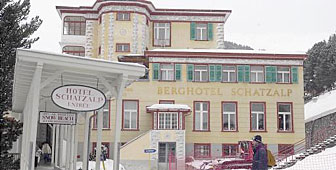A breath of fresh air in Davos

Davos today is best known for its first class skiing and as the host venue for the World Economic Forum. But the Swiss resort first rose to prominence in the 19th century when it became known as a leading centre for the treatment of tuberculosis. Nowadays it specialises in the treatment of asthma.
The establishment of the eastern town of Davos as a tuberculosis (TB) treatment centre can be attributed to one man – Dr Alexander Spengler.
He was the local physician who in the middle of the 19th century noticed that there was an unusually small number of TB sufferers among his patients, and when a case was recorded the invalid made a full and speedy recovery. This caused much excitement among the medical profession and sanatoriums sprang up all over the town.
“The defining feature in treating tuberculosis was the climate,” says Dr Michael Schmitz, the director of the Wolfgang Hochgebirgsklinik (high alpine clinic). “It’s the high mountain environment, it’s the clean air which is free of bacteria, allergens, house dust mites and mould spores.”
At its height, Davos had more than 20 clinics offering hundreds of beds to TB sufferers. The numbers were swollen by local inns and hotels turning themselves into temporary sanatoriums.
The treatment was draconian in its strictness and patients were required to follow a strict regime.
“The patients had to lie down for the whole day and they only got up for meals,” a former TB and asthma specialist, Professor Christian Virchow, remembers what the patients had to go through. “They had to lie outside with special clothes, and fur hats which would keep them warm.”
TB was considered an incurable disease and the only hope of recovery was months, sometimes years, of rest. The discovery of antibiotics in the 1940s led to the virtual elimination of the disease in Western Europe.
More than half of the clinics in Davos were forced to close their doors due to a lack of patients. But they were not shut for long as they shifted their focus from treatment to tourism and reopened as hotels.
One example is the Schatzalp hotel, which still has a snow terrace where the patients used to lie out in the fresh air for hours on end in all weather conditions. In winter today, it’s a haven for weary skiers who want to warm themselves with a cup of mulled wine.
With antibiotics ensuring that TB became a thing of the past, the remaining clinics turned their attention to the treatment of other pulmonary diseases. Clinics such as the Wolfgang Hochgebirgsklinik now treat asthma sufferers. Thankfully an average asthma sufferer’s day is very different from that of the earlier TB patients.
“Asthmatics normally get up early and start with an inhalation exercise, then there is breakfast followed by physical exercise which is done inside and outside,” explains Schmitz. “We have our own sports department which looks like a body building centre and a gym. [for outdoor activities] We use the snow and in summer we use the mountains.”
The emphasis remains on being outside to fill their lungs with the pure Davos air. In winter, they go cross-country skiing, skating and sledging and in summer there is hiking and mountain biking.
The Wolfgang Hochgebirgsklinik is situated on the outskirts of town set in a wooded area back from Lake Davos. Its location is idyllic, and from the outside, looks more like a plush holiday home than a modern clinic.
The building is cleverly set out in a “Y” shape to ensure that every patient’s room is south-facing and warmed by the sun’s rays for as long as possible. This encourages asthma sufferers to sit outside on their balconies to breathe in the therapeutic air.
It’s a far cry from the earlier tuberculosis clinics, like the one on Schatzalp, which found notoriety in the pages of Thomas Mann’s German classic, “The Magic Mountain”. One cannot help but wonder whether Mann would now describe Davos as simply a breath of fresh air.
by Sally Mules

In compliance with the JTI standards
More: SWI swissinfo.ch certified by the Journalism Trust Initiative








You can find an overview of ongoing debates with our journalists here . Please join us!
If you want to start a conversation about a topic raised in this article or want to report factual errors, email us at english@swissinfo.ch.